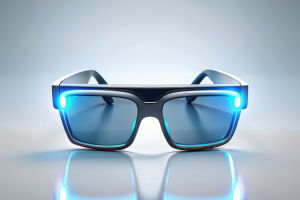It usually starts like this: you're in bed, lights off, phone in hand. You just want to scroll for five more minutes—check one more notification, watch one more reel. Next thing you know, it's 1:47 a.m., your eyes are dry, and your brain won't shut off.
If this sounds familiar, you're not alone. Insomnia symptoms are rising globally, and more researchers are beginning to ask a harder question: are our phones doing more than just keeping us up mentally? Could the devices themselves—through radiation and light—be messing with our biology in ways we don't fully understand?
Let's break down what the science really says, and what you can actually do about it.
Two Culprits: Blue Light and EMF Exposure
Most people know by now that screens emit blue light, a high-energy wavelength that tells your brain it's daytime—even when it's midnight. This isn't just about eye strain. Blue light directly suppresses melatonin, the hormone that makes you feel sleepy. Even 30 minutes of screen exposure before bed can reduce melatonin levels enough to delay sleep onset.
But there's another layer getting more attention: electromagnetic fields (EMFs). Smartphones constantly emit low-level radiation—not the kind that cooks your food, but still biologically active. They're always pinging Wi-Fi, cell towers, Bluetooth. While mainstream health organizations currently say these exposures are safe within current limits, recent sleep studies suggest the story might not be that simple.
How EMFs Could Affect Your Sleep?
Unlike blue light, which has an immediate and obvious effect on alertness, EMF exposure works more subtly. Researchers have found correlations—not always causal, but worth paying attention to.
1. Changes in brain activity: A number of small but controlled studies have shown that EMF exposure can alter brain wave patterns, especially in the alpha and delta ranges—frequencies tied to relaxation and deep sleep.
2. Delayed REM onset: Some experiments found that people exposed to EMFs before bed took longer to enter REM sleep, the stage tied to dreaming and memory processing.
3. Increased sleep fragmentation: Even if total sleep time doesn't drop, EMF exposure may make it harder to stay in deep stages, leaving you feeling less rested.
4. Oxidative stress response: Some animal studies suggest prolonged EMF exposure could increase oxidative stress in brain tissue, which in theory might impact sleep regulation over time. Human studies are still ongoing.
It's important to say: the science isn't fully settled. But the trend is clear—devices are designed for productivity and communication, not rest and recovery. So if your sleep quality has dipped and nothing else seems to help, your phone's invisible signals might be worth considering.
Real-World Habits That Can Help
You don't need to toss your phone in the trash or go live in a signal-free cabin. But if you're serious about improving your sleep, small changes can go a long way—without disrupting your life.
1. Keep your phone at least 3 feet away while you sleep
Radiation intensity drops sharply with distance. If you're currently sleeping with your phone under your pillow or on the nightstand, try moving it to the other side of the room—or better yet, a drawer.
2. Use airplane mode overnight
This instantly cuts off cellular and Wi-Fi signals without turning your phone off. You'll still have your alarm and camera, but reduce continuous background radiation.
3. Dim and shift your screen color after 8 p.m.
Most smartphones have built-in "Night Shift" or "Eye Comfort" modes that reduce blue light. Combine this with lowering brightness and avoiding white backgrounds (like reading on a dark mode app).
4. Limit screen exposure 60 minutes before sleep
Instead of scrolling, try non-screen activities: journaling, light stretching, or listening to music with your eyes closed. It's not just about less light—it's about less stimulation.
5. Don't charge your phone on your nightstand
Chargers can emit small EMF fields too, especially wireless ones. Charging in another room removes the temptation to reach for it and cuts background exposure.
What About Sleep Trackers and Wearables?
Many people turn to smartwatches, rings, or apps to monitor their sleep—and some of these devices use Bluetooth or other low-frequency signals. While they offer helpful data, it's worth knowing they may also emit low-level EMFs through the night.
If you're using a sleep tracker and still waking up tired, try going a few nights without it. See if unplugging helps you recharge in a more literal sense.
This Isn't Just About Sleep—It's About Control
What makes all of this tricky is that most sleep disruption doesn't come from one giant, obvious source. It's cumulative. A bright screen here, a buzzing notification there, a little delay in melatonin, a shorter REM cycle—and suddenly your body's most natural rhythm is out of sync.
Phones are tools. They're not evil, and they're not magic. But like any tool, how and when we use them matters. Especially when it comes to something as fundamental as sleep.
So tonight, try this: turn on airplane mode. Place your phone somewhere you can't easily reach it. Let your bedroom belong to your body, not your signal. You might be surprised what a difference it makes to finally let your mind power down, too.


